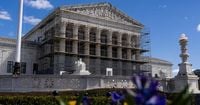The U.S. Supreme Court is poised to make a landmark decision that could reshape the landscape of public education in the United States. On April 30, 2025, the justices heard arguments regarding the fate of St. Isidore of Seville Catholic Virtual School, the nation’s first religious charter school in Oklahoma, which seeks to use government funding to incorporate Catholic teachings into its curriculum.
This case marks a significant moment in the ongoing debate about the intersection of public funding and religious education. For the first time, the court is being asked whether the First Amendment permits, or even necessitates, states to finance charter schools that are overtly religious. The implications of this decision could extend beyond Oklahoma, potentially affecting laws in 45 other states that currently authorize charter schools.
Oklahoma's charter school system, like those in many states, is designed to provide schools with greater flexibility, autonomy, and specialization. Under both state and federal laws, charter schools are classified as public schools, funded and supervised by the state, and must adhere to a non-sectarian mandate. However, St. Isidore, backed by the Archdiocese of Oklahoma City and the Diocese of Tulsa, aims to establish a virtual charter school that integrates Catholic doctrine into its educational framework.
The controversy began when the Oklahoma Supreme Court ruled that allowing religious schools to operate as charter schools would violate both state and federal constitutions. This decision prompted St. Isidore to appeal to the U.S. Supreme Court, arguing that the exclusion of religious schools from the charter system constitutes discrimination against religious adherents. James Campbell, the school’s lawyer, asserted that allowing religious organizations to participate in the charter program would create what he describes as "a true choice" for parents. "You can't create a public program and then just simply say that no religious organization can apply," Campbell stated.
In contrast, Oklahoma Attorney General Gentner Drummond firmly opposes this notion, arguing that the First Amendment explicitly prohibits any state establishment of religion. He emphasized that religious liberty should be understood as the freedom to worship, not as a means for taxpayer-funded religious indoctrination. Drummond articulated concerns that funding a religious charter school could lead to unintended consequences, suggesting that if the Catholic Church could receive public funding for its overtly religious mission, other religious organizations—regardless of their beliefs—might seek similar funding.
St. Isidore's advocates maintain that the school would not compel any student to attend, stating it hopes to offer an additional educational option for families in Oklahoma. They argue that students of "different faiths or no faith" would be welcomed, although the school's hiring policies remain less clear, as charter schools are allowed to adopt their own personnel policies.
This case is not occurring in a vacuum; it follows a series of significant rulings by the Supreme Court regarding the relationship between religion and public funding. In earlier cases from Maine and Montana, the court ruled that states that create programs to assist parents in paying for private schools must allow them to choose religious ones. The current case, however, raises the stakes by questioning whether states can directly sponsor and finance religious charter schools.
The Oklahoma Supreme Court's ruling against St. Isidore noted that permitting such a school would create a "slippery slope" that could undermine the freedom to practice religion without government interference. The majority opinion underscored that under both state and federal law, the establishment of St. Isidore as a charter school is not authorized.
Justice Amy Coney Barrett's recusal from the case adds another layer of complexity. While she has not publicly stated her reasons, her close ties to Notre Dame law professor Nicole Garnett, who has provided legal advice to St. Isidore, have led to speculation that her absence could affect the court's decision. If the court is divided and results in a tie, the existing Oklahoma Supreme Court decision will stand, leaving proponents of religious charter schools to seek another legal avenue.
The stakes are high, as a ruling in favor of St. Isidore could blur the lines established in previous Supreme Court cases that distinguish between government funding for religious schools and programs that facilitate genuine private choice. This could set a precedent that reverberates through the educational landscape across the country.
As the Supreme Court deliberates, the nation watches closely, aware that the outcome may redefine the boundaries of religious expression in public education. Will the justices uphold the principle of separation of church and state, or will they pave the way for a future where public funding supports religious instruction in charter schools? The decision could reshape the relationship between education and religion in America for generations to come.




